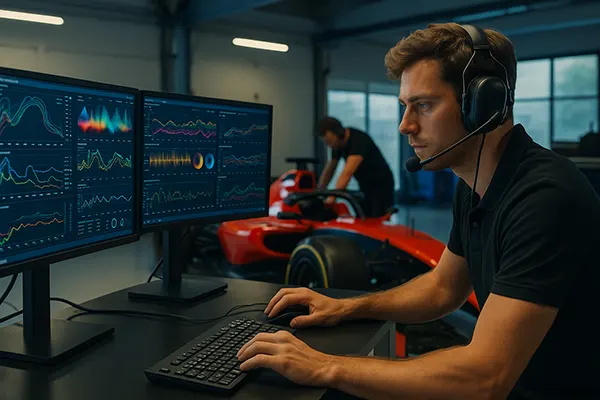
The Crisis of Sports Psychology in Formula 1: What Lies Behind the Helmet?
In recent years, Formula 1 has become a microcosm of extreme pressure, relentless scrutiny, and high-stakes decision-making. As the sport grows more technologically advanced and commercially influential, the human factor behind the wheel is increasingly overlooked. The spotlight on drivers often blinds the public to their internal battles — and nowhere is this more evident than in the quiet crisis surrounding sports psychology in F1.
The Invisible Strain on F1 Drivers
While fans admire the precision and confidence of Formula 1 drivers, the psychological toll behind their performance is rarely discussed. The expectations from teams, sponsors, and global audiences can create a crushing environment where mental health is pushed to the margins. Each race is not just about speed, but also about handling immense emotional pressure — from self-doubt to public judgment.
Drivers face unique psychological stressors, including rapid decision-making at 300 km/h, the trauma of crashes, and prolonged separation from family due to travel. The burden doesn’t lift when the helmet comes off; it often intensifies with media obligations and scrutiny across social networks. It’s a non-stop cycle of performance, judgement, and emotional exhaustion.
In this context, neglecting mental wellness becomes not only a personal risk but a safety issue. Studies and expert opinions increasingly confirm that cognitive fatigue can significantly impair on-track performance, with consequences for both individual drivers and the grid as a whole.
Behind Closed Doors: The Taboo of Mental Health
Despite the physical demands of the sport being well-known, mental health remains an uncomfortable topic in the paddock. The prevailing culture within F1 has historically championed stoicism, resilience, and emotional detachment. Admitting to struggles is often misinterpreted as weakness — something no competitor wants associated with their image.
This silence creates a harmful feedback loop. Without open conversations, there is little institutional pressure to offer psychological support. Drivers may hesitate to seek help, fearing contractual consequences or diminished trust from their team. The irony is that many are silently battling the same issues but feel alone in doing so.
However, things are slowly shifting. Several drivers have begun to publicly speak out, helping to dismantle old stigmas. But for meaningful change to take root, the sport must go beyond individual stories and adopt a systemic approach to mental support.
The Role of Teams and Governing Bodies
Formula 1 teams invest millions into aerodynamics, data science, and physical fitness, yet structured psychological programmes are still lacking across the board. While a few top teams employ performance coaches, these professionals are often focused on maximising output rather than nurturing wellbeing.
The Fédération Internationale de l’Automobile (FIA), which governs Formula 1, has recently acknowledged the need for mental health measures. But implementation remains fragmented and inconsistent. There’s still no uniform requirement for mental health support across all teams or drivers.
Integrating psychologists into race weekends, offering private counselling, and mandating mental resilience training could be crucial steps forward. Drivers are elite performers, but they are also human beings — vulnerable to stress, anxiety, and emotional fatigue like anyone else.
Initiatives That Could Drive Change
Some suggest the inclusion of sports psychologists in the same capacity as physical trainers — visible, integral, and available during race weekends. Others propose anonymous helplines or digital check-ins to allow drivers to report concerns confidentially.
Additionally, team managers and technical staff should receive basic training in psychological first aid. Recognising early signs of burnout or cognitive overload can prevent crises before they escalate. It’s not just about care — it’s about proactive management.
Moreover, creating peer support circles among drivers could build a network of mutual understanding and encouragement. Shared experiences can serve as a powerful antidote to the isolation many drivers experience.

Shifting the Culture of Motorsport
To truly address the crisis, Formula 1 must challenge its own identity. The image of the cold, unshakable racer no longer aligns with the reality of modern competition. Mental toughness should not exclude vulnerability — rather, it should include strategies to manage and discuss it openly.
This cultural shift will take time, but it begins with visibility. Media, fans, and team executives must change the narrative around what it means to be “strong.” Strength is not denying pain; it is having the tools and support to confront it with confidence and care.
Formula 1 has always been a pioneer in pushing technical boundaries. It’s time to lead on the human front as well. Creating an environment where mental health is prioritised, not marginalised, is essential for the future integrity of the sport.
Looking Ahead: From Awareness to Action
The growing attention to mental wellbeing in elite sport offers a moment of reckoning for Formula 1. As younger generations of drivers enter the sport with greater openness, the old paradigms are beginning to erode. But awareness alone is not enough — policy and infrastructure must follow.
Ensuring that every driver, regardless of their team’s size or budget, has access to quality psychological support is not a luxury — it is a necessity. Formula 1 must treat mental health with the same seriousness as safety standards and technical regulations.
The helmet may hide the face, but the mind underneath must not be ignored. Only by lifting that visor can Formula 1 truly move forward into a healthier, more sustainable future.




